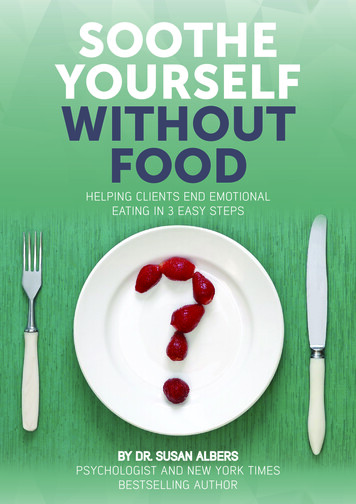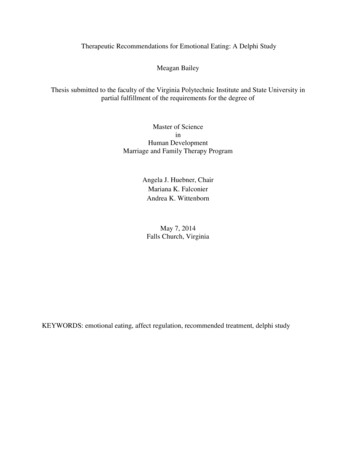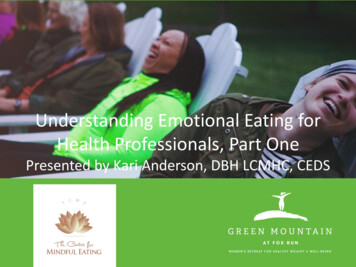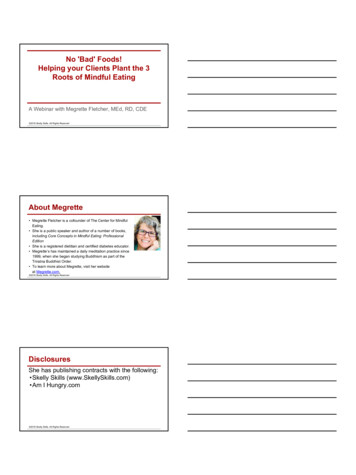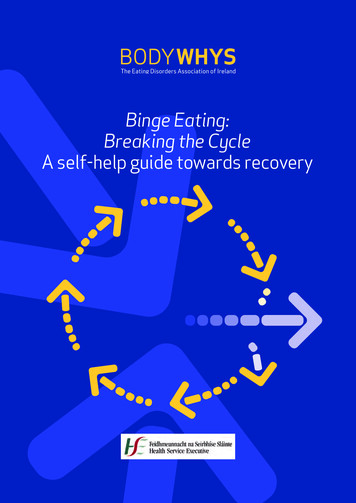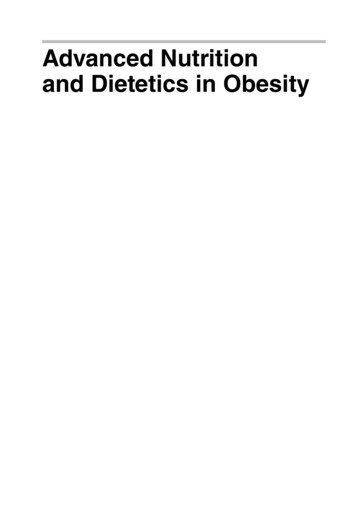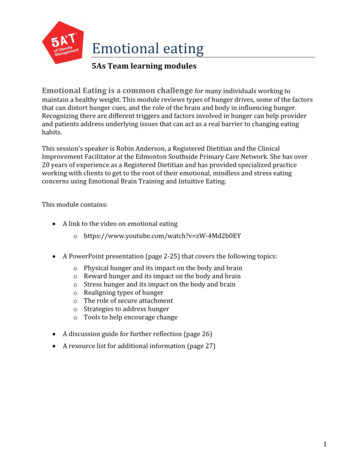
Transcription
Emotional eating5As Team learning modulesEmotional Eating is a common challenge for many individuals working tomaintain a healthy weight. This module reviews types of hunger drives, some of the factorsthat can distort hunger cues, and the role of the brain and body in influencing hunger.Recognizing there are different triggers and factors involved in hunger can help providerand patients address underlying issues that can act as a real barrier to changing eatinghabits.This session’s speaker is Robin Anderson, a Registered Dietitian and the ClinicalImprovement Facilitator at the Edmonton Southside Primary Care Network. She has over20 years of experience as a Registered Dietitian and has provided specialized practiceworking with clients to get to the root of their emotional, mindless and stress eatingconcerns using Emotional Brain Training and Intuitive Eating.This module contains: A link to the video on emotional eatingo https://www.youtube.com/watch?v zW-4Md2b0EYA PowerPoint presentation (page 2-25) that covers the following topics:ooooooo Physical hunger and its impact on the body and brainReward hunger and its impact on the body and brainStress hunger and its impact on the body and brainRealigning types of hungerThe role of secure attachmentStrategies to address hungerTools to help encourage changeA discussion guide for further reflection (page 26)A resource list for additional information (page 27)1
Understanding HungerGetting to the Root of Problem Eating5AsT Learning Collaborative SessionRobin Anderson BSc. RD2
Session Objectives Why we eat - what drives our hunger Why hunger drives goes awry Strategies to help patients3
Why We Eat? Physical - body hunger Reward – stress, emotional &mindless eating4
Physical (Body) HungerEating is a ‘survival based’ behavior driven by your physical need for energy andnutrients. It is linked to your brain’s reward pathways (i.e.we get pleasure from eating) Ideally the system is designed for us to eat whenwe’re hungry & stop when we are satisfied.5
Factors that impact hunger InactivityDepression, mood & medicationsDieting, food restrictionChaotic Eating & poor meal balanceExcess refined carbohydrate & fat intake (highlypalatable foods) Low fibre & liquid calories Lack of sleep stress6
The Plot Thickens But its not as simple as getting people to eat more veggies,less refined foods and appropriate portions . Our North American diet and fixation on food impact ourthe hormones that regulate our appetite.7
Reward HungerHave you ever thought I deserveit!!!It’s myfavorite!I’ll havejustone 8
Reward Hunger Driven by the brain’s reward pathways Driven by dopamine It is ‘normal’ to eat for pleasure However, highly palatable foods hijack the rewardcentres Eating for reward can become self-reinforcing9
When Reward Hunger is Unleashed Food or eating becomes ‘addictive’ thinking about food increases dopamine but during eating the impact (pleasure) isblunted leading to an increased drive to eat more toget the reward activation10
Stress & Hunger11
Others?DailyLifeBrain12
Stress and the Brain3 year oldAdultInfantWhen your brain isstressed your emotionaland primitive brainbecomes dominant. The higher the stress themore reactionary andunconscious ourbehaviors become.13
Impact of Stress on Hunger Without balancing affect of neocortex(hippocampus), we are at the mercy of ourprimitive/reactive brain to stop the stressresponse by using coping mechanisms (i.e.eating) Stress alters glucose and insulin metabolism Stress modifies the brain’s reward pathways14
Tips for Managing Reward Hunger Recognize it’s NOTalways about thefood. Go to the rootof the eating Build your awarenessof your triggers &improve your stressresiliency15
Tips for Managing Reward Hunger Eat to manage your body hungerEnjoy being activeTake time for yourself – practice good self careGet adequate sleepManage your healthCreate a positive attitude – laugh oftenChallenge yourself!16
Ways to Naturally Reward Your BrainGather ‘Moments of Joy’ to activate the reward pathwaysand activate the brain’s left prefrontal cortex Connection with others Laughter Nature, beauty Music Exercise Relaxation Creativity Prayer & Meditation17
Importance of Secure AttachmentWithout a secure attachment, individuals aremore likely to feel overwhelmed, paralyzed,experience hyper arousal or numbness anddissociate.18
Importance of Secure Attachment Disruptions in attachment also create righthemisphere bias in the brain where brain is morefocussed on negative feelings, thoughts andexperiences and prone to avoidance (which cankeep us stuck in negative patterns).19
The Role of Neuroplasticity20
Strategies Mindfulness training Regular, daily check ins with deep breathing Meditation, prayer, etc. Key is learning to be able to observe oneself withcuriosity and compassion and without judgementand criticism (decentering).21
Tools Check ins must be frequent Develop a kind inner voice (good parentexpectations) Using the power proprioception as itstrengthens vagal tone and builds secureattachment Gather ‘Moments of Joy’ to activate thereward pathways22
Moments of JoyFocus on activities that bring patient joy/happiness tohelp activate the Left Prefrontal Cortex as this stops thestress response: Connection with othersLaughterNature, beautyMusicExerciseRelaxationCreativity23
Health Provider RoleDon’t underestimate the impact you can have: When you listen and attune to the patient, itstrengthens their secure attachment and helpsthem calm themselves. Set clear and responsive limits – it modelseffective self-parenting Help them set realistic expectations Refer to other members of the health care team!24
Resources Intuitive Eating PCN courses (Changeways, Managing Emotions, CravingChange) Emotional Brain Training - www.ebt.org EATQ book by Dr. Susan Albers Dr Sharma’s Blog March 18-22, 2013 Mindful Eating www.tcfme.com www.amihungry.com25
Discussion guideThis is a guide for questions and topics to consider after viewing Robin’s video and slide showon the topic of Emotional Eating. These questions can be discussed in a group or on your own.1. Please take a moment on your own and consider what are the key messagesyou took from the speaker today (tips, messages, tools)?o Of the information presented – how do you see yourself applying it in yourpractice?o Do you currently address emotional stress or mindless eating concerns withyour patients?o What are your barriers to having discussions on these topics with yourpatients?o What resources/education supports do you feel would help you addressthese issues with your patients?o Do you know of any resources (written, websites, community programs) onthis topic that would be helpful to other providers?o Is there anything you would like to learn more about on this topic?2. Goal Settingo Take a few moments of quiet time to come up with your own goal concerninga change you feel you can implement in your practice regarding emotionaleating.o Can you anticipate difficulties with achieving this goal?o Are you confident you can reach your goals?26
ResourcesBooks: Tools: Tribole, E. & Resch, E. 2012. Intuitive Eating. New York: St. Martin’s Press.May, M. 2010. Eat What You Love Love What You Eat. Austin, TX: Greenleaf Book GroupPress.Mellin, L. 2010. Wired for Joy. Carlsbad, California: Hay House, Inc.Migliore, M. 1998. The Hunger Within. New York, Broadway Books.Sirota M. 2012. Emotional Overeating: Know the Triggers, Heal Your Mind, andNever Diet Again. Santa Barbara, California: Praeger.5As Team Intervention Tools (available through the Canadian Obesity Network):http://www.obesitynetwork.ca/5As Team):ooWebsites: Stress EatingWhat’s Driving Your HungerMindful Eating: twhatyoulovelovewhatyoueat.com/Emotional Brain Training: http://ebtgroups.comHunger Within: http://www.thehungerwithin.comHeart and et/content2.aspx?c ikIQLcMWJtE&b 4016859&ct ementDr. Sharma’s Obesity Notes March 18-22, tmlView the links listed in this blog which provides you an opportunity to readintroductory posts on Dr. Marcia Sirota’s blog. Marcia Sirota is the author ofEmotional Over-eating, a book about overcoming compulsive eating throughemotional healing and the development of personal empowerment and selfacceptance. She is also a board certified psychiatrist who specializes intreatment of Trauma and Addictions.The Skinny on Obesity:o Episode 3: Hunger and Hormones – A Vicious Cycle (referred to in RobinAnderson’s presentation):ohttps://www.youtube.com/watch?v Yo3TRbkIrowThe Complete Skinny on Obesity:https://www.youtube.com/watch?v moQZd1-BC0Y27
Emotional eating 5As Team learning modules Emotional Eating is a common challenge for many individuals working to . Books: Tribole, E. & Resch, E. 2012. Intuitive Eating. New York: St. Martin's Press. May, M. 2010. Eat What You Love Love What You Eat. Austin, TX: Greenleaf Book Group
